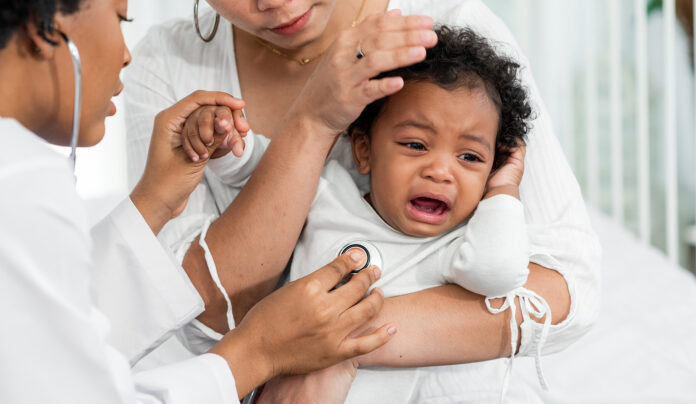When your baby starts sneezing or coughing, it’s tempting to write it off as the common cold. Many parents don’t realize, though, that these symptoms can also be signs of Respiratory Syncytial Virus (RSV), an infection that can lead to more severe respiratory illnesses like bronchiolitis and pneumonia.
Even if parents are aware of RSV, many don’t have a complete understanding of what it is—or that it’s the leading cause of hospitalization for babies under 1. Board-certified obstetrician-gynecologist and mother-of-three Nicole Sparks, MD, experienced this firsthand when her son contracted the virus at 18 months. Because his initial symptoms seemed like a run-of-the-mill cold, Dr. Sparks and her husband weren’t especially concerned — until he started wheezing and his breathing became much more shallow and rapid. “What we thought was ‘just a cold’ could have quickly progressed into something that was much worse,” she says.
Though options for treatment of RSV itself are limited, doctors can treat its symptoms, and Dr. Sparks’s son made a full recovery. The experience motivated her to use her personal experience and medical expertise to educate other parents about some of the common misconceptions about RSV. Keep reading to discover four of the most common myths — and what parents need to know.
Myth #1: Only Children Can Get RSV
Though RSV is most common in children—in fact, two out of three babies will get RSV by age 1—Dr. Sparks says adults can contract it as well. “Anyone, including adults, can get RSV. Chances are, if your child has RSV, you likely have it too—you just may not show any symptoms,” she explains. However, RSV is much more serious in babies under 1: Most hospitalizations occur in infants under 12 months old with RSV, according to Dr. Sparks.
Myth #2: RSV Is Exactly Like the Common Cold
The symptoms of RSV and the common cold look very similar at first: sneezing, cough, runny nose, and decreased appetite. Unlike a typical cold, though, the symptoms of RSV can escalate to labored breathing, wheezing, and fever—and can even require hospitalization. “It is more serious than the common cold because it can lead to bronchiolitis. This is when the very small airways of the lungs get inflamed and swollen with mucus,” Dr. Sparks says. Because bronchiolitis makes it difficult to breathe, RSV is particularly dangerous for babies under 1.
Myth #3: You Can Only Get RSV in the Winter
Like the flu and the common cold, RSV is most prevalent in the winter. That’s not the only time of year you can get RSV, though: Dr. Sparks says it’s also common in the fall and spring.
Myth #4: There’s No Need to See a Doctor For RSV
It’s easy to write off seemingly minor symptoms like a runny nose or occasional cough, but Dr. Sparks says it’s important to stay vigilant if you notice any symptoms of RSV in your children. When in doubt, it’s better to exercise an abundance of caution. “If your child has cold symptoms that are persistent or associated with difficulty breathing, contact your doctor right away,” she explains. Dr. Sparks also recommends having a lower threshold to contact your doctor if your child is under 12 months old.
Myth #5: There’s No Way to Prevent RSV
While there’s no way to guarantee you or your family won’t contract RSV, you can take preventative measures to reduce the risk. Dr. Sparks recommends practicing good hygiene by washing your hands frequently and teaching young children handwashing skills early, as RSV can survive for up to 30 minutes or more on the hands. “Studies have shown that infection of infants often follows infection of older siblings who may be asymptomatic,” she explains.
Other habits like avoiding touching your face, disinfecting frequently touched surfaces like phones and doorknobs, and covering your mouth when you cough or sneeze can also limit the spread of RSV. These preventative measures—in addition to keeping a watchful eye out for any symptoms of RSV—can help keep your family healthy. As Dr. Sparks says: “Recognize the symptoms and seek treatment early if they are worsening or persistent.”
Article reposted from Popsugar.com.







